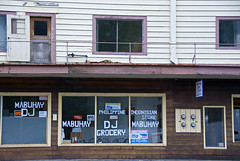
Thirty-five trillion is a lot of bags cluttering up landfills, and oceans, and alleyways.
The inevitable question faced by shoppers at the grocery checkout, how to tote their food home, may soon get simpler.
Faced with a growing push in some states and cities to ban or limit use of plastic bags, many grocers are encouraging consumers to recycle bags or bring their own. At least one, Whole Foods Market Inc., plans to do away with the bags altogether.
But many grocers report that about 90 percent of their shoppers still ask for plastic. And the bag makers, a billion-dollar industry, oppose bans, calling instead for consumers to reuse or recycle the bags. They favor recent legislation that encourage the recycling of bags but don't ban them outright.Plastic bags have a split personality: They draw shoppers with their durability and light weight, but environmentalists consider them a scourge, tangled in tree branches or swirling in waterways where they can be scarfed up by unsuspecting aquatic creatures.
[From Grocers, Bag Makers Rethink Plastic: Financial News - Yahoo! Finance]

As I've said several times, I think a tipping point has been reached, and there is going to be some drastic plastic (fantastic) industry shake-ups in the near future, and plastic bags in grocery stores are going to be phased out.
The United States lags behind many other countries globally in placing limits on plastic bags. Ireland and Germany levy fees for every bag handed out by stores, and several African nations have set thickness requirements that have effectively banned the flimsy thin bags that float in the air. Earlier this month, China, the world's fastest growing economy, banned free plastic shopping bags and encouraged people to use cloth ones instead.
"This issue is not going away. It is not necessarily going to take over the plastic bag market in a year or two, but it is indicative of a real trend," said Allen Hershkowitz, director of the solid waste program at the Natural Resources Defense Council, an environmental group.
Plastic bags are a favorite of grocers because of their price, around 2 cents per bag compared to 5 cents for paper. Used widely since the 1970s, environmentalists now estimate between 500 billion to a trillion bags are produced annually worldwide. Made from fossil fuel-based polymers, the bags are virtually indestructible, taking years to break down and commonly ending up in landfills.
[snip]
Hilex Poly Co., a South Carolina firm that sells about 30 billion bags annually, has set up a recycling facility to reprocess bags collected at grocers like some Kroger and A&P stores. The company is selling a bag that will degrade after being exposed to air and sun for several weeks, breaking down into carbon dioxide and water. And it is developing technology that measures how many items baggers put in bags to cut down on underfilling.
David Pastrich, the company's president, said the shift was largely driven by customer demand, the surge of anti-bag legislation, and the fact that plastic bags were becoming synonymous with litter for many people.
"If nobody wanted this, we wouldn't invest money in it," he said. "We want to be on the right side of the environmental threshold."
